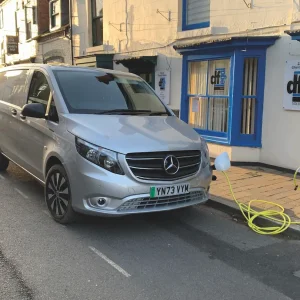Ever got tired of having to arrange for your vans to be despatched several miles down the road to a local dealer to be serviced or repaired? Alternatively, do you get depressed every time you look at the tired old 1950s-style workshop sitting in the corner of your yard with its oil-spattered floor and leaky roof and wished you could replace it easily and quickly?
Worry no more.
Inspired perhaps by pop-up shops and restaurants that regularly appear in high street premises that would otherwise remain vacant, major-league van, truck and trailer hire fleet Dawsonrentals has come up with a portable pop-up workshop designed to meet the needs of light commercial operators. The Portable Auto Centre was unveiled last April at the Commercial Vehicle Show.
What Van? is so tickled by the idea that we’ve decided to award it our Innovation of the Year accolade for 2016.
Big enough to accommodate high-roof 3.5-tonners, the portable workshop can be used for everything from changing a van’s oil and tyres to sorting out its electrical system and replacing windscreens. It can be employed to deal with many of the dents and scrapes light commercial vehicles collect too and can be kitted out with paint-mixing equipment, a low-energy infrared curing system, a low-noise compressor, climate control, a three-stage extraction unit and a scissor lift.
Dawsonrentals is partnering with Xpress Centres to offer training in body repairs and refinishing.
The biggest of these clever workshop modules has four bays and can include a windowed reception area too. Such a facility makes it easier for a fleet to take on third-party work as well as meet the needs of its own vehicles.
As well as bolting them together at its own locations Dawsonrentals is building the workshops to order for major fleets.They take less than two days to set up says the company and cost approximately £100,000 to purchase outright. However they will be more commonly taken on a five-year lease.
Dawsonrentals has seven dedicated van sites UK-wide. It is present in Cardiff, Doncaster, Ipswich, Milton Keynes, Newcastle upon Tyne, Reading and Skelmersdale in Lancashire.
Over the last year it has invested some £48m on acquiring 3,500 light commercials with the aim of keeping the average age of its fleet below 12 months.
At the end of 2014 it launched a Specialist Vehicle Unit to supply tippers, dropsides, double-cab vans with rear seating accommodation and a cargo area at the back and welfare vans to the construction industry. Equipped with cooking and washing facilities, a table with seats and an onboard toilet, welfare vans are becoming increasingly important as construction companies seek to comply with duty of care legislation where their employees are concerned.
Dawsonrentals offers a variety of different light commercial hire packages including flexible long-term rental as an alternative to contract hire.
Vehicles rented under this arrangement can be modified to meet the customer’s requirements with for example the addition of a tow-bar and warning beacons and clients can have their own corporate livery applied. Vans obtained under long-term rental are far easier to return to a hire fleet when they are no longer required than they would be if they were leased.
Did you know…?
Highly Commended winners Ford and Telogis claim that fuel expenditure can be cut by at least 10% to 15% by fitting their plug-in telematics system.
Highly Commended
Ford Telematics powered by Telogis
Ford’s decision to partner with Telogis in order to offer a telematics system for light commercials wins it our Highly Commended award.
Capable of being fitted to vans registered from 2010 onwards and available from any Ford dealership, its big advantage is that it is easy to fit because it can be plugged into the vehicle’s onboard diagnostics port. Installation should take no more than 30 minutes Ford says and the package can be moved from one light commercial to another easily and quickly.
Having equipped their vehicles fleet managers can track them, keep an eye on fuel consumption and driver behaviour and be alerted if for example the engine is overheating or the oil needs changing. Routing and scheduling and other applications that may be required by fleets can be bolted on too.
Nor is the technology restricted solely to Fords. It can be slotted into any light commercial that meets the age parameter outlined above although with non-Fords only the most basic data is available; think in terms of trip distance and fuel used.
With Fords however 20 to 25 core lines of data are on offer; with the potential for 100s of others to be included.





